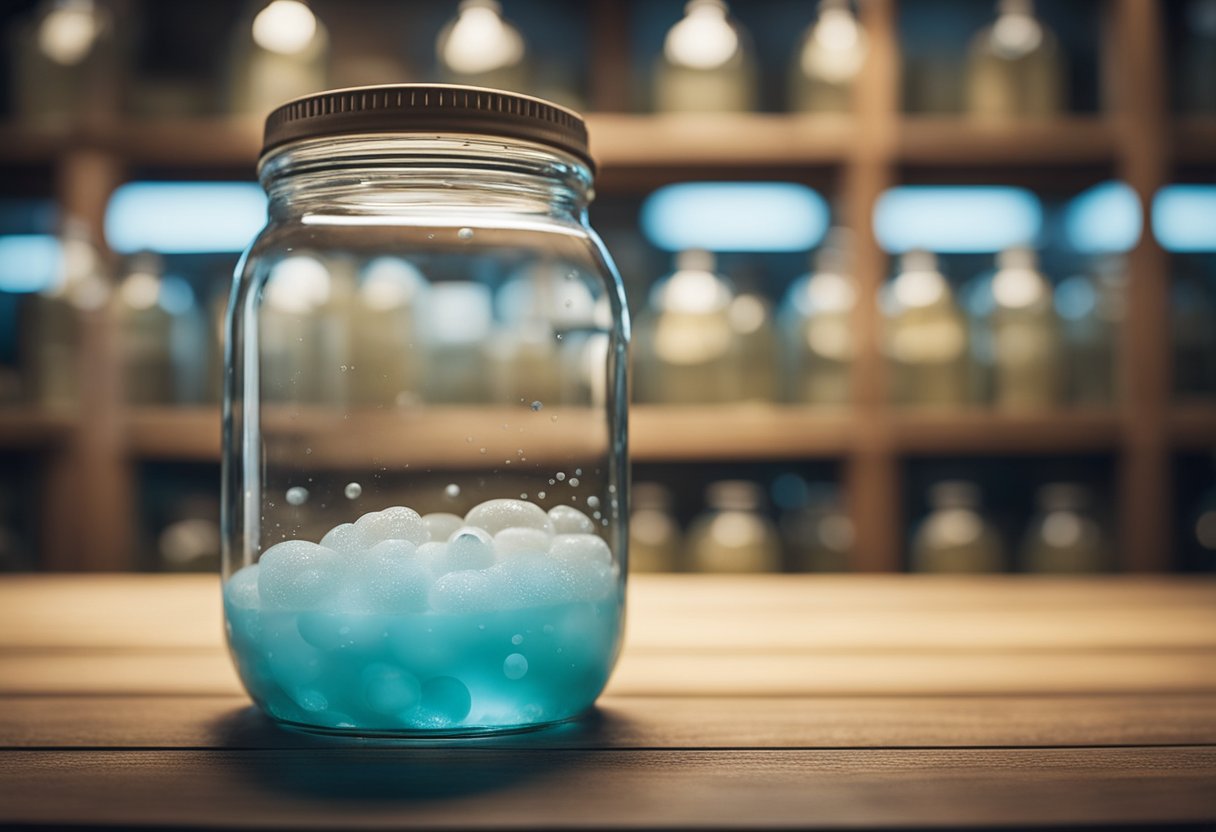As a certified sommelier, I often get asked the question, “What does kombucha taste like?” Kombucha is a fermented tea that has gained popularity in recent years due to its health benefits and unique taste.
It is made by combining tea, sugar, and a symbiotic culture of bacteria and yeast (SCOBY) that ferments the mixture over time.

The taste profile of kombucha can vary depending on a number of factors, including the length of fermentation, the type of tea used, and any additional ingredients that are added for flavor.
Generally, kombucha has a slightly sour and vinegar-like taste with a hint of sweetness. It also has a natural effervescence, giving it a fizzy finish.
Some people find the taste of kombucha to be an acquired taste, while others enjoy it from the first sip.
Key Takeaways
- Kombucha is a fermented tea that has a slightly sour and vinegar-like taste with a hint of sweetness.
- The taste profile of kombucha can vary depending on the length of fermentation, type of tea used, and any additional ingredients added for flavor.
- Kombucha has a natural effervescence, giving it a fizzy finish.
The Basics of Kombucha
Kombucha is a fermented tea that has been around for centuries. It is made by adding a symbiotic culture of bacteria and yeast (SCOBY) to sweetened tea and allowing it to ferment.
The fermentation process produces a slightly effervescent, tangy, and refreshing drink that is often enjoyed for its health benefits.
The taste of kombucha can vary depending on the brand and the fermentation process. Generally, it has a tart and slightly sweet taste, similar to a sour sparkling apple cider or ginger ale.
The longer it ferments, the more sour it becomes. Some people describe the taste as an acquired one, but many find it enjoyable and refreshing.
Fermentation is the process by which the SCOBY breaks down the sugar in the tea and produces beneficial probiotics, enzymes, and organic acids.
These compounds give kombucha its unique flavor and health benefits. The fermentation process can take anywhere from a few days to a few weeks, depending on the temperature and other factors.
The symbiotic culture of bacteria and yeast (SCOBY) is a thick, rubbery, pancake-like substance that floats on the surface of the tea during fermentation.
It is often referred to as the “mother” of the kombucha because it is responsible for the fermentation process.
The SCOBY is made up of various strains of bacteria and yeast that work together to break down the sugar in the tea and produce the beneficial compounds that give kombucha its unique flavor and health benefits.
Overall, kombucha is a delicious and healthy drink that has been enjoyed for centuries. Its tangy and slightly sweet taste, combined with its health benefits, make it a popular choice for many people.
The Taste Profile of Kombucha
Kombucha is a unique and refreshing beverage that has been enjoyed for centuries. It is made by fermenting sweetened tea with a symbiotic colony of bacteria and yeast, also known as SCOBY.
The fermentation process produces a tangy and slightly sweet taste that is often described as vinegary and fizzy.
When you take your first sip of kombucha, you’ll notice a slight effervescence that tingles on your tongue. This fizzy sensation is a byproduct of fermentation, specifically the carbon dioxide that is released from the yeast and beneficial bacteria that is feeding on the sugar.
The level of carbonation can vary depending on the brand and fermentation process.
The taste of kombucha can also vary depending on the flavorings and fermentation length. Some kombuchas can be mouth-puckeringly sour, while others are more mildly sweet.
The sweet notes are initially greeted by your taste buds, followed by a tangy and slightly acidic finish. The taste can be described as similar to a sour sparkling apple cider or ginger ale.
Kombucha has a unique, complex flavor profile that dances between sweet and sour. The tangy and vinegary taste comes from the acetic acid produced during the fermentation process.
The longer the fermentation process, the more vinegary the taste becomes.
Overall, kombucha has a refreshing and unique taste that is perfect for those looking for an alternative to sugary drinks.
It is a great way to add some variety to your beverage choices and is a healthy and delicious addition to any diet.
Influence of Ingredients on Kombucha’s Taste

Kombucha’s taste is influenced by several factors, including the type of tea used, the amount of sugar added, the yeast and bacteria strains used, and any additional flavors added during the second fermentation.
In this section, I will discuss the impact of these ingredients on the taste of kombucha.
Tea Types and Kombucha Taste
The type of tea used in making kombucha has a significant impact on its taste. Black tea is the most commonly used tea, and it produces a robust, full-bodied flavor. Green tea, on the other hand, produces a milder, more delicate taste.
White tea is the most subtle of all teas, and it produces a light, floral taste. Oolong tea produces a fruity, earthy flavor that is somewhere between black and green tea.
Role of Sugar in Kombucha’s Taste
Sugar is a crucial ingredient in kombucha, as it provides food for the yeast and bacteria during fermentation. The amount of sugar used in making kombucha affects its taste.
Kombuchas that have a higher sugar content are naturally sweeter compared to kombuchas with low sugar content.
Although it’s not advisable to change the sugar content of kombucha during its first fermentation, you can always add more sugar during the second fermentation to increase sweetness.
Impact of Yeast and Bacteria
The yeast and bacteria strains used in making kombucha also have a significant impact on its taste. The most common yeast strain used is Saccharomyces cerevisiae, which produces a mild, fruity taste.
The most common bacteria strains used are Gluconacetobacter xylinus and Acetobacter xylinum, which produce acetic and gluconic acids, respectively. These acids give kombucha its characteristic tangy, sour taste.
Effect of Added Flavors
During the second fermentation, additional flavors can be added to enhance the taste of kombucha. Ginger, fruits, herbs, spices, and botanicals are commonly used to add flavor.
These added flavors can significantly alter the taste of kombucha. For example, adding ginger can give kombucha a spicy kick, while adding fruits can make it sweeter and more fruity.
In summary, the taste of kombucha is influenced by the type of tea used, the amount of sugar added, the yeast and bacteria strains used, and any additional flavors added during the second fermentation.
Understanding the impact of these ingredients can help you create a kombucha that suits your taste preferences.
The Fermentation Process and its Impact on Kombucha’s Taste
As a fermentation enthusiast, I find the process of brewing kombucha fascinating. Kombucha is made by fermenting sweetened tea with a symbiotic culture of bacteria and yeast (SCOBY).
During fermentation, the SCOBY consumes the sugar in the tea and produces a variety of compounds that give kombucha its unique taste and fizzy texture.
The length of fermentation plays a crucial role in determining the taste of kombucha. A shorter fermentation period results in a sweeter and less acidic brew, while a longer fermentation period leads to a more tart and vinegary taste.
The ideal fermentation time varies depending on personal preference and the ambient temperature, but a typical range is between 7 and 14 days.
After the first fermentation, some kombucha brewers opt to do a second fermentation to further enhance the flavor and carbonation.
During the second fermentation, additional sugar or fruit juice can be added to feed the yeast and produce more carbon dioxide. This results in a fizzier and slightly sweeter drink with a more complex flavor profile.
The acidity of kombucha is another key factor in its taste. The fermentation process produces acetic acid, lactic acid, and other organic acids that contribute to the tangy and slightly sour taste of kombucha.
The pH of kombucha typically ranges between 2.5 and 3.5, which is more acidic than most other beverages.
Finally, the fizziness of kombucha is a result of the carbon dioxide produced during fermentation. The carbon dioxide is trapped in the liquid, creating a refreshing and effervescent mouthfeel.
The level of carbonation can vary depending on the brewing method and the length of fermentation.
In summary, the fermentation process is what gives kombucha its unique taste and texture. The length of fermentation, the addition of fruit juice or sugar during the second fermentation, the acidity, and the carbonation all play a role in determining the final flavor profile of this popular drink.
Health Benefits and Nutritional Components of Kombucha

Kombucha is a fermented tea that has been consumed for centuries for its potential health benefits. It is made by fermenting sweetened tea with a symbiotic culture of bacteria and yeast (SCOBY).
Kombucha contains a variety of beneficial compounds, including probiotics, antioxidants, and enzymes.
Probiotics and Gut Health
Kombucha is a good source of probiotics, which are beneficial bacteria that can help improve gut health. Probiotics have been shown to help with a variety of digestive issues, including constipation, diarrhea, and irritable bowel syndrome.
Kombucha may also help boost the immune system by promoting the growth of beneficial bacteria in the gut.
Antioxidants and Detoxification
Kombucha is rich in antioxidants, which are compounds that help protect the body from damage caused by free radicals.
Free radicals are unstable molecules that can damage cells and contribute to the development of chronic diseases such as cancer and heart disease. Kombucha may also help detoxify the liver by increasing the production of liver enzymes.
Anti-Inflammatory and Other Benefits
Kombucha has been shown to have anti-inflammatory properties, which may help reduce inflammation in the body and potentially lower the risk of chronic diseases such as cancer and heart disease.
Kombucha may also help improve cholesterol levels by reducing LDL cholesterol levels. However, it is important to note that kombucha contains trace amounts of alcohol and caffeine, and should be consumed in moderation.
Overall, kombucha can be a healthy addition to a balanced diet. However, it is important to note that some people may experience side effects such as upset stomach, infections, or allergic reactions.
Kombucha should be avoided by pregnant or breastfeeding women, as well as those with weakened immune systems.
As with any dietary supplement, it is important to speak with a healthcare provider before adding kombucha or other probiotic supplements to your diet.
Comparing Kombucha with Other Beverages

When it comes to taste, kombucha is unique compared to other beverages. It has a distinct flavor profile that can be described as slightly sour, tangy, and effervescent. Here’s how kombucha compares to some other popular drinks:
Soda
Soda is known for its sweet and bubbly taste. Unlike soda, kombucha has a more complex flavor profile that includes a slight sweetness, but also has a tangy and sour taste.
Kombucha also has a lighter carbonation compared to soda, which can make it easier to drink.
Sparkling Apple Cider
Sparkling apple cider has a crisp and refreshing taste, similar to kombucha. However, kombucha has a more pronounced sour taste, which can take some getting used to.
Kombucha also has a lower sugar content compared to sparkling apple cider, making it a healthier option.
Sour Beer
Sour beer is brewed with wild yeast and bacteria, which gives it a sour taste. Kombucha is also brewed with bacteria and yeast, but it has a lower alcohol content compared to sour beer.
Kombucha also has a lighter body and is less filling compared to sour beer.
Ginger Ale
Ginger ale has a spicy and sweet taste, while kombucha has a slightly sweet and sour taste. Kombucha also has a lighter carbonation compared to ginger ale, which can make it easier to drink.
Sour Sparkling Apple Cider
Sour sparkling apple cider has a tart and refreshing taste, similar to kombucha. However, kombucha has a more complex flavor profile that includes a slight sweetness and a tangy taste.
Kombucha also has a lower sugar content compared to sour sparkling apple cider, making it a healthier option.
Overall, kombucha has a unique flavor profile compared to other popular drinks. While it may take some getting used to, it’s worth trying for its potential health benefits and refreshing taste.
Making Homemade Kombucha
I love making homemade kombucha. It’s a fermented drink that’s easy to make and tastes delicious.
Kombucha is sometimes called mushroom tea because it’s made with a SCOBY (symbiotic culture of bacteria and yeast) that looks a bit like a mushroom.
You can buy a SCOBY online or get one from a friend who already brews kombucha.
To make kombucha, you’ll need a few basic ingredients: tea, sugar, and water. You’ll also need a SCOBY and some starter tea.
Starter tea is just some kombucha from a previous batch that you can use to kickstart the fermentation process.
Here’s a simple recipe for making homemade kombucha:
- Boil 4 cups of water and add 4 tea bags. Let the tea steep for 5-10 minutes.
- Remove the tea bags and stir in 1 cup of sugar until it dissolves.
- Let the tea cool to room temperature.
- Pour the tea into a glass jar and add the SCOBY and starter tea.
- Cover the jar with a cloth or paper towel and secure it with a rubber band.
- Let the kombucha ferment for 7-14 days, depending on how strong you like it.
- Taste the kombucha daily until it reaches your desired flavor.
- Once the kombucha is ready, remove the SCOBY and some starter tea for your next batch.
- Bottle the remaining kombucha and store it in the fridge.
I like to use a glass jar with a spigot for easy pouring. You can also add fruit or herbs to your kombucha for extra flavor. Just be sure to use clean, sanitized equipment to avoid contamination.
If you’re in the Denver area, there are several local kombucha brands to try. Some of my favorites include Happy Leaf Kombucha, Rowdy Mermaid Kombucha, and Buchi Kombucha.
These brands use high-quality ingredients and have a wide variety of flavors to choose from.
Frequently Asked Questions:
- Does homemade kombucha taste different from store-bought kombucha? Yes, homemade kombucha can taste different from store-bought kombucha because it’s not standardized like commercial brands. However, homemade kombucha can be just as delicious and even more satisfying because you made it yourself.
- What does kombucha look like? Kombucha can look cloudy or fizzy because of the fermentation process. It can also have a layer of SCOBY on top, which is normal and safe to consume.
Making homemade kombucha is a fun and rewarding hobby. Once you get the hang of it, you can experiment with different teas and flavors to create your own unique brew.
Possible Side Effects and Precautions

As with any food or drink, there are some possible side effects and precautions to keep in mind when consuming kombucha.
Allergic Reactions
Kombucha is typically made from black or green tea, sugar, and a symbiotic culture of bacteria and yeast (SCOBY). While rare, some people may have an allergic reaction to one or more of these ingredients.
Symptoms of an allergic reaction may include hives, itching, swelling, or difficulty breathing. If you experience any of these symptoms after consuming kombucha, stop drinking it immediately and seek medical attention.
Headache
Kombucha contains a small amount of alcohol, usually less than 0.5%. While this amount is generally considered safe for most people, it may cause headaches in some individuals.
If you experience a headache after drinking kombucha, try reducing your intake or avoiding it altogether.
Nausea
Kombucha is a fermented drink that contains probiotics, which can be beneficial for gut health. However, some people may experience nausea or an upset stomach after consuming kombucha.
If you are prone to digestive issues, start with a small amount of kombucha and gradually increase your intake over time.
Breastfeeding
There is limited research on the safety of drinking kombucha while breastfeeding. While kombucha is generally considered safe for most people, it is best to consult with your healthcare provider before consuming it if you are breastfeeding.
Weakened Immune System
Kombucha is a fermented drink that contains live bacteria and yeast. While these probiotics can be beneficial for most people, they may pose a risk for individuals with weakened immune systems, such as those with HIV/AIDS or undergoing chemotherapy.
If you have a weakened immune system, it is best to consult with your healthcare provider before consuming kombucha.
Overall, kombucha is a safe and healthy drink for most people when consumed in moderation. However, if you experience any adverse side effects after drinking kombucha, stop consuming it and consult with your healthcare provider.
Frequently Asked Questions
Where can I find kombucha for purchase?
Kombucha can be found in most health food stores, grocery stores, and online retailers. It is also possible to make kombucha at home using a kombucha starter kit.
Is kombucha considered an alcoholic beverage?
Kombucha is typically considered a non-alcoholic beverage. However, it does contain a small amount of alcohol, usually less than 0.5%.
Does kombucha contain caffeine?
Kombucha is typically made with black or green tea, both of which contain caffeine. However, the amount of caffeine in kombucha can vary depending on the brand and brewing process.
What are the ingredients in kombucha?
Kombucha is typically made with tea, sugar, and a symbiotic culture of bacteria and yeast (SCOBY). Some brands may also add fruit or other flavors to their kombucha.
How does kombucha benefit gut health?
Kombucha is a probiotic beverage, which means it contains beneficial bacteria that can help improve gut health. Probiotics have been linked to a variety of health benefits, including improved digestion and immune function.
Can you describe the taste of kombucha?
Kombucha has a unique taste that is effervescent, slightlysweet, and slightly tangy. The flavor can vary depending on the brewing process and any added flavors or ingredients.
Some people describe the taste as similar to sparkling apple cider or a sour beer.







